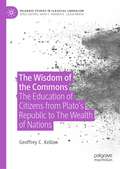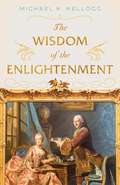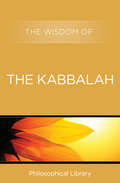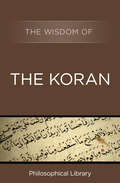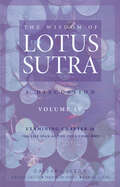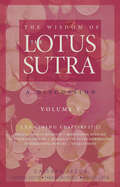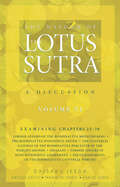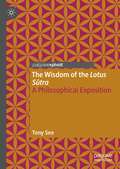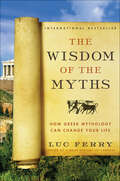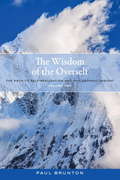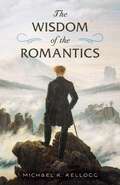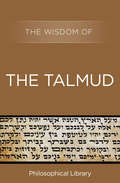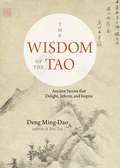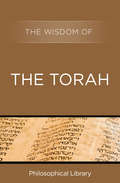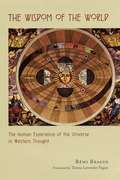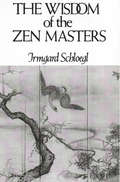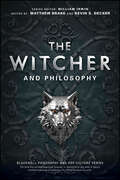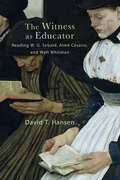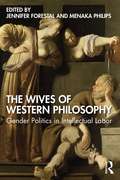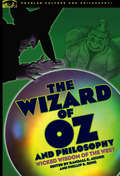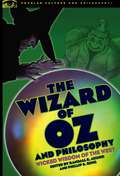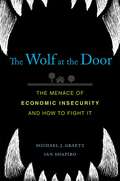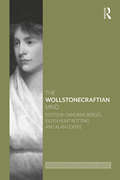- Table View
- List View
The Wisdom of the Commons: The Education of Citizens from Plato’s Republic to The Wealth of Nations (Palgrave Studies in Classical Liberalism)
by Geoffrey C. KellowThe Wisdom of the Commons examines the history and philosophy of civic education as the essential political part of liberal education. This study distinguishes itself from other works on liberal and civic education by focusing explicitly on the civic and liberal education of those citizens who are not destined for prominent positions within politics and government but are still a part of and relevant to political society. It considers this strand of liberal and civic education, in both its ancient and modern iterations, by focusing on the philosophies of Plato, Cicero, Locke, Rousseau, and Adam Smith.
The Wisdom of the Enlightenment
by Michael K. KelloggEnlightenment—Aufklärung in German, Lumières in French—is more an idea than a period. But it is an idea that took hold in a particular historical context of revolutionary scientific advances, increasing economic and social freedom, rising literacy and prosperity, and a greater willingness to challenge the authoritarianism of the seventeenth and eighteenth centuries. In The Wisdom of the Enlightenment, author Michael K. Kellogg points to 1637, the year that gave us Rene Descartes&’ landmark inquiry into truth, as the beginning of a period that radically changed individual human thought and collective societal action. From Descartes&’ assertion of &“I think, therefore I am,&” to the philosophies of Enlightenment thinkers like Moliere, Spinoza, Voltaire, Hume, and Kant, this book charts the new and revolutionary philosophies at a time when progress seemed possible across the whole range of human knowledge and endeavor. In sweeping aside tired superstitions and applying a new scientific methodology, the Enlightenment ideas of progress through free exercise of reason ushered us into the modern world. This engaging and comprehensive survey of Enlightenment thoughts and thinkers is a celebration of the faith that all problems are solvable by human reason. ,
The Wisdom of the Kabbalah (Wisdom)
by The Wisdom SeriesExplore the third of the great literatures in Judaism While many readers may have heard of Kabbalah in recent years, how many understand the origins and unique perspective of this collection of Jewish mystical beliefs? Handed down in the oral tradition for thousands of years and transcribed in fourteenth-century Spain, the Kabbalah is the classical expression of Jewish mysticism. This collection draws from the main work of Kabbalah—Sepher ha-Zohar, or The Book of Splendor—and offers insight into the great body of Hebrew literature that sprang up and grew parallel to the traditional writings of rabbinical literature. Written in the dialectic style as a commentary to the Torah, the Kabbalah examines man&’s mystical union with God in thoughts of wisdom and deeds of kindness through a symbol-laden examination of the God before creation. A mix of ethics and mysticism, Kabbalah&’s wisdom is frequently imparted through gematria, or a symbolic language based in numbers that correspond with the letters of the Hebrew alphabet. This ebook features a new introduction, image gallery, and index of the Hebrew alphabet.
The Wisdom of the Koran: The Wisdom Of The Torah, The Wisdom Of The Talmud, The Wisdom Of The Koran, The Wisdom Of Muhammad, And The Wisdom Of Buddha (Wisdom)
by The Wisdom SeriesDiscover the beliefs and lessons of Islam&’s sacred textThe Koran, the sacred text at the heart of the second-largest religion in the world, is regarded by Muslims as the exact word of God as revealed to the prophet Muhammad. Representing the ultimate authority on almost every issue related to Muslim life, the Koran&’s lessons and parables offer the faithful moral and spiritual guidance. In The Wisdom of the Koran, readers will discover a selection of key chapters such as &“The Night Journey&” and &“The Cave,&” footnotes to convey context and meaning, as well as several stories from Judeo-Christian history. This invaluable anthology is an excellent step toward greater understanding of one of the finest pieces of Arabic prose and the Muslim faith.
The Wisdom of the Lotus Sutra, vol. 4: A Discussion (Wisdom of the Lotus Sutra)
by Daisaku IkedaThe Lotus Sutra, Shakyamuni Buddha's highest teaching, explainsthat all people—regardless of gender, social status or education—canuncover the Buddha nature they inherently possess. Based on thisempowering and compassionate sutra, Nichiren Daishonin revealedthe supreme practice for the modern world.Now, in clear, down-to-earth terms, SGI President Ikeda and SokaGakkai Study Department leaders Katsuji Saito, Takanori Endo andHaruo Suda explore the profound meaning of the Lotus Sutra'stwenty -eight chapters. Basing themselves on Nichiren Daishonin's lectureson the Lotus Sutra, The Record of the Orally Transmitted Teachings,they explain the concepts that form the foundation of SGImembers' Buddhist practice. Through their discussions, the ancienttext of the Lotus Sutra comes alive, brimming with profound significanceand practical advice for living in today's world.Volume four covers chapter 16 of the twenty-eight chapter Lotus Sutra.
The Wisdom of the Lotus Sutra, vol. 5: A Discussion (Wisdom of the Lotus Sutra)
by Daisaku IkedaThe Lotus Sutra, Shakyamuni Buddha's highest teaching, explainsthat all people—regardless of gender, social status or education—canuncover the Buddha nature they inherently possess. Based on thisempowering and compassionate sutra, Nichiren Daishonin revealedthe supreme practice for the modern world.Now, in clear, down-to-earth terms, SGI President Ikeda and SokaGakkai Study Department leaders Katsuji Saito, Takanori Endo andHaruo Suda explore the profound meaning of the Lotus Sutra'stwenty -eight chapters. Basing themselves on Nichiren Daishonin's lectureson the Lotus Sutra, The Record of the Orally Transmitted Teachings,they explain the concepts that form the foundation of SGImembers' Buddhist practice. Through their discussions, the ancienttext of the Lotus Sutra comes alive, brimming with profound significanceand practical advice for living in today's world.Volume five covers chapters 17-22 of the twenty-eight chapter Lotus Sutra.
The Wisdom of the Lotus Sutra, vol. 6: A Discussion (Wisdom of the Lotus Sutra)
by Daisaku IkedaThe Lotus Sutra, Shakyamuni Buddha's highest teaching, explainsthat all people—regardless of gender, social status or education—canuncover the Buddha nature they inherently possess. Based on thisempowering and compassionate sutra, Nichiren Daishonin revealedthe supreme practice for the modern world.Now, in clear, down-to-earth terms, SGI President Ikeda and SokaGakkai Study Department leaders Katsuji Saito, Takanori Endo andHaruo Suda explore the profound meaning of the Lotus Sutra'stwenty -eight chapters. Basing themselves on Nichiren Daishonin's lectureson the Lotus Sutra, The Record of the Orally Transmitted Teachings,they explain the concepts that form the foundation of SGImembers' Buddhist practice. Through their discussions, the ancienttext of the Lotus Sutra comes alive, brimming with profound significanceand practical advice for living in today's world.Volume six covers chapters 23-28 of the twenty-eight chapter Lotus Sutra.
The Wisdom of the Lotus Sutra: A Philosophical Exposition
by Tony SeeThe Lotus Sūtra is one of the most important sūtras in Mahāyāna Buddhism. Translated by Kumārajīva in the 5th century, its teachings have inspired many Buddhist scholars such as Chih-i and Saichō from the Tiantai (Tendai) tradition, Dōgen from the Zen tradition and Nichiren the 13th century Kamakura founder and reformer. There is a relative lack of scholarly works that are devoted to an examination of how its philosophical ideas were received and developed throughout history. This book remedies that lack by tracing the origin and development of Lotus Sūtra thought, and interprets the text from the perspective of the doctrine of Buddha-nature in Mahāyāna Buddhism.
The Wisdom of the Myths: How Greek Mythology Can Change Your Life (Learning To Live Ser.)
by Luc Ferry“Marvelously wise and expansive. . . . one could call [Ferry’s] prose conversational, but it’s rare to have a conversation quite this wonderful.” —Boston GlobeA fascinating journey through Greek mythology that explains the myths' timeless lessons and meaningHeroes, gods, and mortals. The Greek myths are the founding narratives of Western civilization: to understand them is to know the origins of philosophy, literature, art, science, law, and more. Indeed, as Luc Ferry shows in this masterful book, they remain a great store of wisdom, as relevant to our lives today as ever before. No mere legends or clichés (“Herculean task,” “Pandora's box,” “Achilles heel,” etc.), these classic stories offer profound and manifold lessons, providing the first sustained attempt to answer fundamental human questions concerning “the good life,” the burden of mortality, and how to find one's place in the world. Vividly retelling the great tales of mythology and illuminating fresh new ways of understanding them, The Wisdom of the Myths will enlighten readers of all ages.“With Luc Ferry as a guide, our passage through the storied landscape of Greek mythology becomes a captivating lesson in philosophy.” —Le Monde (France)“Ferry draws out deeper meanings of myths about how the world works and of the place of mortals in it . . . The Wisdom of the Myths is part of a grand enterprise to revive practical wisdom and secular humanism.” —The Guardian“Comprehensive. . . . [T]he breadth of evidence will sway most readers –Publishers Weekly“Impressive. . . . A worthy, fun way to enjoy the ancient myths while learning some philosophy.” —Kirkus Reviews
The Wisdom of the Overself
by Paul BruntonInspired by Paul Brunton's years spent with sages in Asia, The Wisdom of the Overself and its companion volume The Hidden Teaching Beyond Yoga were written at the request of these remarkable teachers, who recognized that Brunton had a significant role to play in the transmission of traditional wisdom to the West. Here is a profound re-creation of these teachings, brought to life and made accessible by Brunton's insights. In print since the 1940s, Brunton's works are considered to be among the most comprehensive, clear, and practical guides on the path to enlightenment. Brunton unfolds the grand vision for human development by investigating consciousness as the source of all experience; how to move from ego-centered life to the transcendent reality; the interplay of karma, free will, and grace; the nature of evil and suffering; how to awaken intuition and penetrative insight; the passage through death to rebirth; and psychic experiences and mystic visions. He also provides seven ultramystic exercises to open the door to higher consciousness, including a healing meditation on the sun; practices for transforming the future, dream, and sleep; and a meditation on the timeless self. These techniques lead to the deepest spiritual realizations--to the true "Wisdom of the Overself."This new edition has been updated to incorporate Brunton's final revisions. It includes a new foreword plus supplementary reading material selected from the author's archives by the Paul Brunton Philosophic Foundation.ContentsForeword by the Paul Brunton Philosophic Foundation 1. Prefatory 2. The Meaning of Mentalism 3. The Birth of the Universe4. Studies in Dreams5. The Metaphysics of Sleep6. The Secret of the "I"7. The Scorpion of Death8. The Immortal Overself 9. The Shadows of Evil and Suffering10. The War and the World11. The World-Mind12. The Unveiling of Reality 13. Initiation into Mystical Experience 14. The Yoga of the Discerning Mind 15. The Mystical Phenomena of Meditation 16. Some Fruits of PhilosophyAppendix: Additional Resources from The Notebooks of Paul Brunton, Compiled by the Paul Brunton Philosophic Foundation EditorsFrom the Trade Paperback edition.
The Wisdom of the Romantics
by Michael K. KelloggExplore the transformative power of Romanticism—where emotion, imagination, and contradiction collide—through the eyes of its greatest thinkers and artists.The post-Enlightenment movement known as Romanticism is a messy period; so messy, in fact, that many scholars eschew any attempt to define it. In reaction to the overreliance placed on reason by Enlightenment thinkers, Romantics emphasized individual freedom, emotional intensity, introspection, sincerity, and heightened imagination. They sought out nature at its wildest and most sublime: tall mountains, steep gorges, and resounding cataracts. They dabbled in the gothic and grotesque, in mythology, the sacred, and the mystical. Romanticism was a turning inward into subjectivity. In The Wisdom of the Romantics, author Michael Kellogg profiles such disparate authors as Rousseau and Balzac, Goethe and Hegel, Wordsworth and Jane Austen, revealing that classifying Romantic thinkers is a highly subjective enterprise – which is the whole point.That isn&’t to say that the change in thinking was inconsequential. Far from it. The transition from Haydn and Mozart to Beethoven and Chopin could not have been more dramatic. The German-born composer Giacomo Meyerbeer brought grand opera to new heights. The paintings of Francisco Goya, William Blake, Caspar David Friedrich, and J. M. W. Turner were all part of the transition away from a classical, academic style to the &“emotive extremes&” that heralded the coming of impressionism in the latter part of the century. In this latest entry into his popular Wisdom series, Kellogg explores the mercurial and ephemeral movement known as &“Romanticism,&” arguing that what Romanticism &“is&” includes many contradictions, precisely what the rationalists rejected.
The Wisdom of the Talmud: The Wisdom Of The Torah, The Wisdom Of The Talmud, The Wisdom Of The Koran, The Wisdom Of Muhammad, And The Wisdom Of Buddha (Wisdom)
by The Wisdom SeriesDiscover the ancient wisdom and historical influence of a cornerstone of Judaism The Wisdom of the Talmud presents a thorough history and overview of the Talmud, the rabbinical commentary on the Torah that was developed in the Jewish academies of Palestine and Babylonia. From the close of the Biblical canon to the end of the fifth century, Jewish scholars studied the scripture and worked to develop—and debate—supplementary understandings of the Torah&’s directions on a variety of topics. From man&’s purpose and miracles, to marriage and wellness, to consciousness and community, the Talmud considers what it means to practice faith on a daily basis and through a changing world. This book is an essential and approachable guide for understanding how interpretation of the Torah has guided Jewish life for thousands of years. This ebook features a new foreword, image gallery, and list of proverbs and sayings of the rabbis.
The Wisdom of the Tao: Ancient Stories that Delight, Inform, and Inspire
by Deng Ming-Dao<p>Taoism is an ancient Chinese philosophy that emphasizes living in harmony with the universe. It is a tradition that has become widely popular in Europe and North America over the past fifty years--largely through its core text, the Tao Te Ching. <p>The Wisdom of the Tao is filled with over 140 ancient stories express great truth by fusing anecdotes with philosophy. The stories are frequently humorous, ribald, irreverent, or sarcastic--but they always speak to great and universal truths.</p>
The Wisdom of the Torah: The Wisdom Of The Torah, The Wisdom Of The Talmud, The Wisdom Of The Koran, The Wisdom Of Muhammad, And The Wisdom Of Buddha (Wisdom)
by The Wisdom SeriesCelebrate one of the world&’s greatest collections of pure literature In Hebrew, the word Torah means instruction, and throughout thousands of years this collection of writing has offered just that—instruction in the central beliefs of three world religions: Judaism, Christianity, and Islam. But by observing the Torah, or the Hebrew Bible, as a collected work of multiple authors spanning generations, the modern reader can look beyond its fundamental instruction. The Wisdom of the Torah concentrates on the Hebrew Bible as a book of philosophy and literature and offers some of its most powerful and poetic passages, including &“The Poems of King David,&” &“The Parables of King Solomon,&” and &“The Love Songs of King Solomon.&” In these works, readers find many lyrical and timeless reflections on what it means to have faith and to be a member of the human race. This ebook features a new introduction, image gallery, timeline of the Torah and Judaic history, and index of the Books of the Torah.
The Wisdom of the World: The Human Experience of the Universe in Western Thought
by Rémi BragueWhen the ancient Greeks looked up into the heavens, they saw not just sun and moon, stars and planets, but a complete, coherent universe, a model of the Good that could serve as a guide to a better life. How this view of the world came to be, and how we lost it (or turned away from it) on the way to becoming modern, make for a fascinating story, told in a highly accessible manner by Rémi Brague in this wide-ranging cultural history. Before the Greeks, people thought human action was required to maintain the order of the universe and so conducted rituals and sacrifices to renew and restore it. But beginning with the Hellenic Age, the universe came to be seen as existing quite apart from human action and possessing, therefore, a kind of wisdom that humanity did not. Wearing his remarkable erudition lightly, Brague traces the many ways this universal wisdom has been interpreted over the centuries, from the time of ancient Egypt to the modern era. Socratic and Muslim philosophers, Christian theologians and Jewish Kabbalists all believed that questions about the workings of the world and the meaning of life were closely intertwined and that an understanding of cosmology was crucial to making sense of human ethics. Exploring the fate of this concept in the modern day, Brague shows how modernity stripped the universe of its sacred and philosophical wisdom, transforming it into an ethically indifferent entity that no longer serves as a model for human morality. Encyclopedic and yet intimate, The Wisdom of the World offers the best sort of history: broad, learned, and completely compelling. Brague opens a window onto systems of thought radically different from our own.
The Wisdom of the World: The Human Experience of the Universe in Western Thought
by Rémi BragueWhen the ancient Greeks looked up into the heavens, they saw not just sun and moon, stars and planets, but a complete, coherent universe, a model of the Good that could serve as a guide to a better life. How this view of the world came to be, and how we lost it (or turned away from it) on the way to becoming modern, make for a fascinating story, told in a highly accessible manner by Rémi Brague in this wide-ranging cultural history. Before the Greeks, people thought human action was required to maintain the order of the universe and so conducted rituals and sacrifices to renew and restore it. But beginning with the Hellenic Age, the universe came to be seen as existing quite apart from human action and possessing, therefore, a kind of wisdom that humanity did not. Wearing his remarkable erudition lightly, Brague traces the many ways this universal wisdom has been interpreted over the centuries, from the time of ancient Egypt to the modern era. Socratic and Muslim philosophers, Christian theologians and Jewish Kabbalists all believed that questions about the workings of the world and the meaning of life were closely intertwined and that an understanding of cosmology was crucial to making sense of human ethics. Exploring the fate of this concept in the modern day, Brague shows how modernity stripped the universe of its sacred and philosophical wisdom, transforming it into an ethically indifferent entity that no longer serves as a model for human morality. Encyclopedic and yet intimate, The Wisdom of the World offers the best sort of history: broad, learned, and completely compelling. Brague opens a window onto systems of thought radically different from our own.
The Wisdom of the World: The Human Experience of the Universe in Western Thought
by Rémi BragueWhen the ancient Greeks looked up into the heavens, they saw not just sun and moon, stars and planets, but a complete, coherent universe, a model of the Good that could serve as a guide to a better life. How this view of the world came to be, and how we lost it (or turned away from it) on the way to becoming modern, make for a fascinating story, told in a highly accessible manner by Rémi Brague in this wide-ranging cultural history. Before the Greeks, people thought human action was required to maintain the order of the universe and so conducted rituals and sacrifices to renew and restore it. But beginning with the Hellenic Age, the universe came to be seen as existing quite apart from human action and possessing, therefore, a kind of wisdom that humanity did not. Wearing his remarkable erudition lightly, Brague traces the many ways this universal wisdom has been interpreted over the centuries, from the time of ancient Egypt to the modern era. Socratic and Muslim philosophers, Christian theologians and Jewish Kabbalists all believed that questions about the workings of the world and the meaning of life were closely intertwined and that an understanding of cosmology was crucial to making sense of human ethics. Exploring the fate of this concept in the modern day, Brague shows how modernity stripped the universe of its sacred and philosophical wisdom, transforming it into an ethically indifferent entity that no longer serves as a model for human morality. Encyclopedic and yet intimate, The Wisdom of the World offers the best sort of history: broad, learned, and completely compelling. Brague opens a window onto systems of thought radically different from our own.
The Wisdom of the Zen Masters
by Irmgard Schloegl Christmas HumphreysUnlike most other formal religions, the Japanese school of Zen Buddhism has no canonized corpus of sacred literature which will reveal the "truth" to diligent readers. There are, however, numerous collections of anecdotes and aphorisms that may serve to convey the sensibility which underscores the practice of Zen. Drawing on these traditional sources, Dr. Irmgard Schloegl of the Buddhist Society in London has gathered into one short volume a sampling of stories and sayings that are a valuable introduction to the study of Zen. "If in every mind burns a flame of the Buddha's Enlightenment," Christmas Humphreys writes in his foreword to The Wisdom of the Zen Masters, "there is nothing to seek and nothing to acquire. We are enlightened, and all the words in the world will not give us what we already have. The man of Zen, therefore, is concerned with one thing only, to become aware of what he already is..." The task of the Japanese Zen master has been to guide his pupils in their awakening. The means used vary--from severe physical discipline to the proposition of enigmatic riddles, or koans--but always to the same end, Enlightenment: experiencing the Great Death of the worldly "I."
The Witcher and Philosophy: Toss a Coin to Your Philosopher (The Blackwell Philosophy and Pop Culture Series)
by Kevin S. Decker Matthew BrakeEmbark on a revealing philosophical journey through the universe of The Witcher “If I'm to choose between one evil and another, I'd rather not choose at all,” growls the mutant “witcher,” Geralt of Rivia. Andrzej Sapkowski's Witcher books lay bare the adventures of monster hunters like Geralt, who seek to avoid humanity's conflicts and live only for the next kill and the coin that comes with it. But Geralt's destiny is complicated by his relationship with a powerful sorceress, Yennefer of Vengerberg. When he connects with a displaced princess, Ciri, Geralt lands right in the middle of the political conflicts of the Continent, which is endangered by Nilfgaard, a domineering southern kingdom that threatens to conquer the world. Part of the Blackwell Philosophy and Pop Culture series, The Witcher and Philosophy brings on twenty-seven philosophers to test their mettle against werewolves, the bruxa, strigas, vodyanoi, and kikimora; their work addresses the phenomenally popular books, three standalone Witcher video games, and the hit Netflix streaming show. These authors pass on their fascination with all manner of horror and sorcery: the mutations that make Geralt and others witchers, the commonalities between the Continent and post-apocalyptic settings, the intricacies of political power and scandal in the world of The Witcher, and reflections of our own world's changing views on race and gender that might offer hope—or portend a grim future. Engaging and accessible, The Witcher and Philosophy considers key themes and questions such as: Who is human, and who is a monster? Can Geralt afford to stay neutral? What kind of politics do sorceresses engage in? How many universes converge on the Continent? If we stare long enough into the abyss, does it stare back into us? Silver or steel? “Destiny is just the embodiment of the soul's desire to grow,” says Jaskier the bard, proving himself to be a natural philosopher. The tales of The Witcher remind us that our lives are a play written by both choice and destiny. And it is your destiny to read and be inspired by The Witcher and Philosophy.
The Witness as Educator: Reading W. G. Sebald, Aimé Césaire, and Walt Whitman
by David T. HansenIlluminates the power in bearing witness as an ethical orientation toward the world and its people.In The Witness as Educator, David T. Hansen examines the idea of bearing witness. He shows how it constitutes an ethical orientation that heeds human yearnings for justice, beauty, and meaning. He engages the work of three exemplary witnesses: W. G. Sebald, Aimé Césaire, and Walt Whitman. Sebald powerfully confronts the human costs of the violence of the nineteenth and twentieth centuries. Césaire evokes a creative Black consciousness in the face of European colonialism and attests to this outlook's joyous and painful development. Whitman's witness to American life, alongside his poignant testimony about caring for wounded soldiers during the American Civil War, speaks to a hope deeper than hope for the prospects of democracy. Hansen shows how these witnesses did not "choose" to write about their respective themes. They had to. The circumstances of their lives and the events of their time summoned them to bear witness. Hansen addresses how their efforts, supplemented by those of other witnesses whose testimony he incorporates, hold considerable educational promise in a world marked by continued misunderstanding and discord and yet also by great possibility.
The Wives of Western Philosophy: Gender Politics in Intellectual Labor
by Jennifer Forestal and Menaka PhilipsThe Wives of Western Philosophy examines the lives and experiences of the wives and women associated with nine distinct political thinkers—from Socrates to Marx—in order to explore the gendered patterns of intellectual labor that permeate the foundations of Western political thought. Organized chronologically and representative of three eras in the history of political thought (Ancient, Early Modern, and Modern), nine critical biographical chapters explore the everyday acts of intellectual labor and partnership involving these "wives of the canon." Taking seriously their narratives as intimate partners reveals that wives have labored in remarkable ways throughout the history of political thought. In some cases, their labors mark the conceptual boundaries of political life; in others, they serve as uncredited resources for the production of political ideas. In all instances, however, these wives and intimates are pushed to the margins of the history of political thought. The Wives of Western Philosophy brings these women to the center of scholarly interest. In so doing, it provides new insights into the intellectual biographies of some of the most famed men in political theory while also raising important questions about the gendered politics of intellectual labor which shape our receptions of canonical texts and thinkers, and which sustain the academy even today.
The Wizard of Oz and Philosophy
by Randall E. Auxier Phil SengFrom the bedtime story by L. Frank Baum to the classic 1939 film, no story has captured the imaginations of generations of children - and adults - like The Wizard of Oz. The story of Dorothy's journey through Oz, the colorful characters, places, songs, and dialogue have permeated popular culture around the world. The contributors to this volume take a very close look at The Wizard of Oz and ask the tough questions about this wonderful tale. They wonder if someone can possess a virtue without knowing it, and if the realm of Oz was really the dream or if Kansas was the dream. Why does water melt the Wicked Witch of the West and why does Toto seem to know what the other characters can't seem to figure out? The articles included tackle these compelling questions and more, encouraging readers to have discussions of their own.
The Wizard of Oz and Philosophy: Wicked Wisdom of the West
by Randall E. Auxier Phillip S. SengEssays explore philosophical themes in the Wizard of Oz saga, comprising the books by L. Frank Baum, the 1939 film, the novel Wicked, and related films and plays.
The Wolf at the Door: The Menace of Economic Insecurity and How to Fight It
by Ian Shapiro Michael J. GraetzAmericans face economic hardship but respond with fantastical solutions, from tax-cut magic to the end of capitalism. Michael Graetz and Ian Shapiro focus on what truly worries people: their own insecurity. The authors propose concrete reforms affecting jobs, unemployment, health care, and wages and share strategies to achieve changes people need.
The Wollstonecraftian Mind (Routledge Philosophical Minds)
by Eileen Hunt Botting Sandrine Bergès Alan CoffeeThere has been a rising interest in the study of Mary Wollstonecraft (1759-1797) in philosophy, political theory, literary studies and the history of political thought in recent decades. The Wollstonecraftian Mind seeks to provide a comprehensive survey of her work, not only placing it in its historical context but also exploring its contemporary significance. Comprising 38 chapters by a team of international contributors this handbook covers: the background to Wollstonecraft’s work Wollstonecraft’s major works the relationship between Wollstonecraft and other major philosophers Wollstonecraftian philosophy Wollstonecraft’s legacy Essential reading for students and researchers in philosophy, Wollstonecraft’s work is central to the study of political philosophy, literature, French studies, political thought, and feminism.
